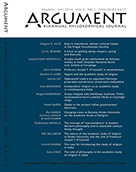Odpowiedź Lowe’a na argument Ramseya przeciwko rozróżnieniu uniwersalia–indywidua
The answer of Lowe to Ramsey’s argument against the distinction universal vs. individual
Author(s): Joanna LucSubject(s): Philosophy, Metaphysics, Ontology
Published by: Wydawnictwo Uniwersytetu Komisji Edukacji Narodowej w Krakowie
Keywords: ontology; metaphysics; ontological dependence; problem of universals; categories;
Summary/Abstract: At the beginning of this article Ramsey’s argumentation against universal particular distinction is presented. It is based on the assumption that this division requires another one: namely, subject predicate distinction. This argumentation was a starting point for Lowe, who does not respect the aforementioned assumption. In his theory, there are not two but four categories, namely: substantial universals, non substantial universals, substantial particulars, and non substantial particulars. Two of these categories are categories of universals; the other two are categories of particulars. Lowe tries to define categories in an ontological way, that is, with essential use of ontological notions. These notions are rigid and non rigid existential dependence, which are themselves defined in terms of necessity and existence. The contribution of this paper is an analysis of Lowe’s solution. In the first place, it is confronted with Ramsey remarks. Then other objections are considered. Some of them do not respect the very idea of autonomous ‘ontological way’ in philosophy. Others concern Lowe’s particular version of it. Possible answers to all of these objections are presented, such that Lowe’s theory is defended. However, there is no ultimate conclusion here. In the author’s opinion autonomy and the value of ontology cannot be shown from a purely external position. We should first assume that this discipline does make sense and then explore its virtues by using its notions.
Journal: ARGUMENT: Biannual Philosophical Journal
- Issue Year: VI/2016
- Issue No: 1
- Page Range: 223-237
- Page Count: 15
- Language: Polish

